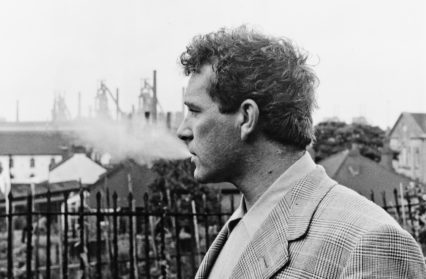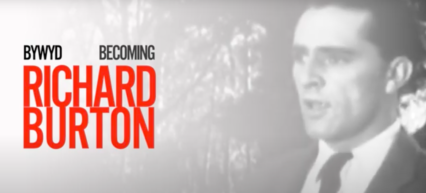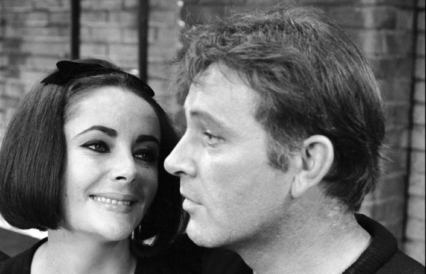Wales Arts Review shares a collection of its past articles on Richard Burton, from the Becoming Richard Burton series to podcasts and other related works from the archive.
Richard Walter Jenkins (10 November 1925 – 5 August 1984) was born to a working class family in Pontrhydyfen, Glamorgan. As a child, Richard had a great love for arts and literature and studied acting under Philip Burton, whose surname he later adopted as his professional name.
He secured a six-month scholarship at Exeter College, Oxford, and later received his first paid role as an actor. Richard deemed his role in a production of The Druid’s Rest (November 1943) a ‘nothing part’ with very few lines, however James Redfern of the New Statesman declared that he had shown ‘exceptional ability’. It was these words which Burton claimed encouraged him to continue his career as an actor. He made his film debut in Emlyn Williams’ The Last Days of Dolwyn (1949) and went on to secure small parts in numerous British films and plays, including his supporting role in a production of The Lady’s Not for Burning (1949), deemed Burton’s career breakthrough.
In the early 1950s Burton began to really make a name for himself as a Shakespearean actor. He starred as Prince Hal in adaptions of Henry IV, Part I and Henry IV, Part 2 and received critical acclaim for both roles, even being dubbed ‘the next Olivier’. He then began transitioning towards more Hollywood productions, starting with the lead role in My Cousin Rachel in 1952. From this point on, he featured in many historical films such as The Desert Rats (1953) and The Robe (1953), before completing a season at the Old Vic in London.
Burton then continued to film in Hollywood to much less critical acclaim than he was used to, with short breaks to feature in more British Shakespearean productions. This spell was broken when he starred as Jimmy Porter in a filmic adaptation of John Osborne’s play Look Back in Anger (1959), now seen as one of the defining films of the era, earning him BAFTA and Golden Globe nominations.
A 1960 Broadway production of Camelot ran for three years and won Burton the Tony Award for Best Actor in a Musical. In 1961, he began filming his career-defining role as Mark Antony in Cleopatra. While filming, he met and fell in love with actress Elizabeth Taylor, who he would later marry and divorce twice, resulting in one of the most talked about scandals of the time. Burton and Taylor went on to make 11 films together during their careers.
Who’s Afraid of Virginia Woolf? (1966) has been dubbed the couple’s greatest on screen succuess. Burton hoped this would be for Taylor what his 1964 Broadway production of Hamlet had been for him, after he had received such huge critical acclaim. He was right, and both actors won their first BAFTA Awards for the film.
Burton was praised for a ‘triumphant performance’ in Clint Eastwoods’ 1968 Where Eagles Dare, but from this point on his popularity began to decline. Burton’s tumultuous relationship with alcohol was well known throughout his career. However, he was nominated for seven Academy Awards and won BAFTAs, Golden Globes, and Tony Awards for Best Actor. Deemed by many as ‘the voice of Wales’, Burton never forgot his roots despite his unprecedented success, and was buried with a copy of the collected poems of Dylan Thomas following his death in 1984.
Becoming Richard Burton / Bywyd Richard Burton
Following the opening of the Becoming Richard Burton Exhibition from National Museum Cardiff and Swansea University, Wales Arts Review has published a series of essays to run concurrently with the exhibition. The essays are curated by Daniel G. Williams, director of the Richard Burton Centre at Swansea University, and each explores a different Burton film.
Becoming Richard Burton | Equus: Burton’s Scream
Daniel G.Williams kicks the series off with his exploration of Equus.
The Spy Who Came in from the Cold | Becoming Richard Burton
Dr Richard Robinson takes a look at The Spy Who Came in from the Cold.
Cleopatra: ‘Not at all bad’ | Becoming Richard Burton
Rob Penhallurick discusses Cleopatra (1963).
The Wild Geese | Becoming Richard Burton
Dr Gethin Matthews examines The Wild Geese (1978).
The Last Days of Dolwyn | Becoming Richard Burton
Dr Gwenno Ffrancon takes a look at Burton’s screen debut, Emlyn Williams’ The Last Days of Dolwyn.
Nineteen Eighty-Four | Becoming Richard Burton
Martin Johnes gives thought to Burton’s final film: an adaptation of George Orwell’s Nineteen Eighty-Four.
Who’s Afraid of Virginia Woolf? | Becoming Richard Burton
Alexia Bowler considers the instant classic, Who’s Afraid of Virginia Woolf? .
The Medusa Touch | Becoming Richard Burton
Here, Alan Bilton considers The Medusa Touch.
You can read more about the Becoming Richard Burton / Bywyd Richard Burton exhibition here.
Richard Burton from the Wales Arts Review Archive
See a collection of archival Richard Burton pieces from Wales Arts Review below.
Phil Morris reviews Playing Burton, a film adaptation of the extraordinary life and career of Richard Burton, one of Wales’ most highly accredited actors.
Adam Somerset reviews BBC Four’s semi-biographical drama, Burton and Taylor, with a critical eye.
The Richard Burton Diaries | Book Review
James Lloyd reviews The Richard Burton Diaries, edited by Chris Williams, taking a look back at the Welsh actor’s life and temperament.
Wales Archive | Richard Burton and Dick Cavett (1980)
There have been few interviewers to ever touch Dick Cavett for his relaxed, personable approach to his subjects and his talent for making them at ease was rarely more obviously on display than over the two hours of interviews recorded in a studio before a live audience with Richard Burton in 1980.
Theatre | Wastwater (The Richard Burton Company)
Taking inspiration from its namesake, the deepest lake in England, Simon Stephen’s Wastwater promises a triptych delving into the dark recesses of human nature.
A Richard Burton Exhibition | Becoming
David Llewellyn reviews Becoming…, a special exhibition held at the National Museum Cardiff which tells the story of how the young Welsh boy became an international star.
Podcast 15 | Becoming Richard Burton & Disability in the Arts
In this episode we’re thinking about narrative, from the process of curating an exhibition, in particular Becoming…., and the new television series Wandavision, to changing social attitudes towards disability and inclusivity within the Arts.














